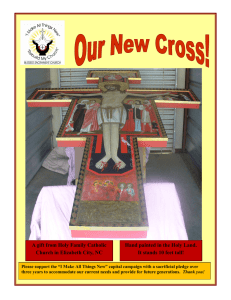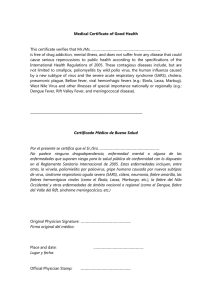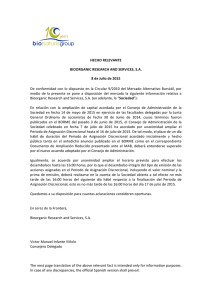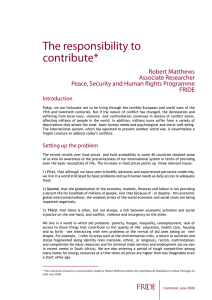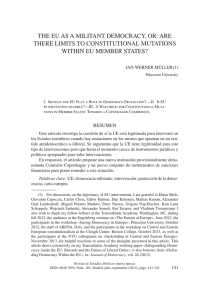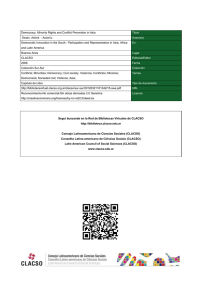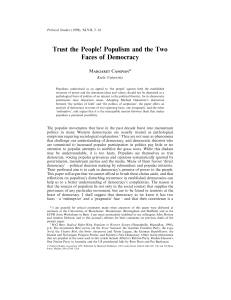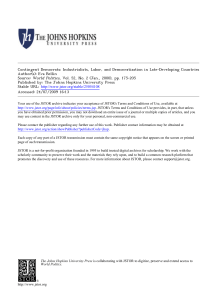GABRIEL DE LA PAZ The author aims to offer empirical evidence in
Anuncio
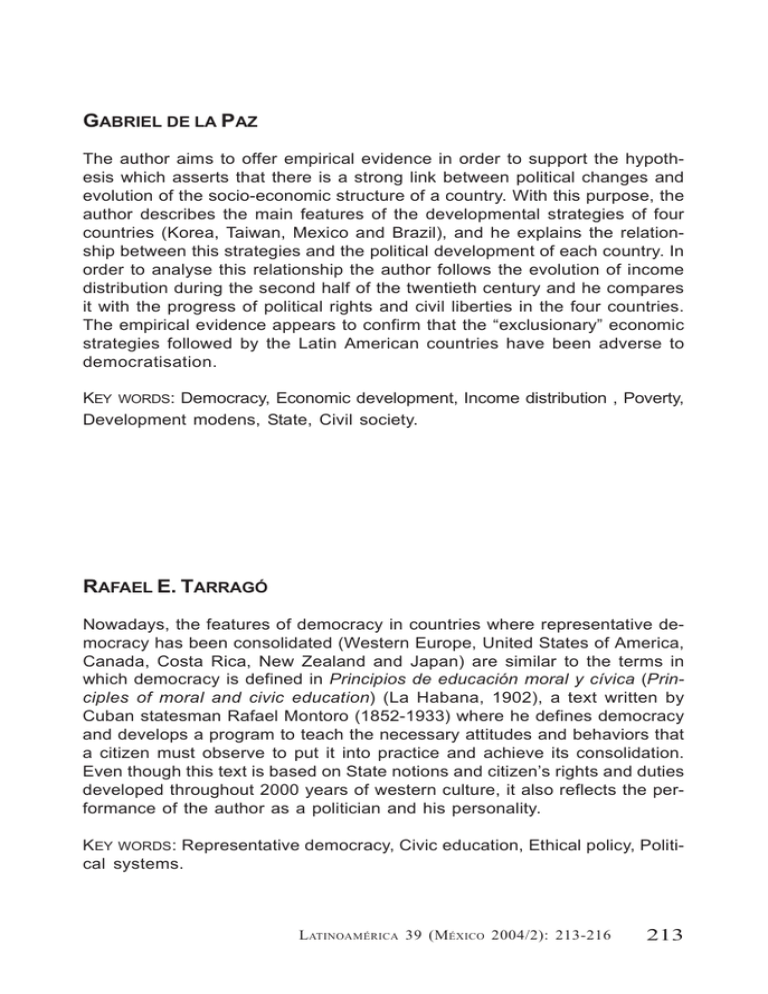
ABSTRACS GABRIEL DE LA PAZ The author aims to offer empirical evidence in order to support the hypothesis which asserts that there is a strong link between political changes and evolution of the socio-economic structure of a country. With this purpose, the author describes the main features of the developmental strategies of four countries (Korea, Taiwan, Mexico and Brazil), and he explains the relationship between this strategies and the political development of each country. In order to analyse this relationship the author follows the evolution of income distribution during the second half of the twentieth century and he compares it with the progress of political rights and civil liberties in the four countries. The empirical evidence appears to confirm that the “exclusionary” economic strategies followed by the Latin American countries have been adverse to democratisation. KEY WORDS: Democracy, Economic development, Income distribution , Poverty, Development modens, State, Civil society. RAFAEL E. TARRAGÓ Nowadays, the features of democracy in countries where representative democracy has been consolidated (Western Europe, United States of America, Canada, Costa Rica, New Zealand and Japan) are similar to the terms in which democracy is defined in Principios de educación moral y cívica (Principles of moral and civic education) (La Habana, 1902), a text written by Cuban statesman Rafael Montoro (1852-1933) where he defines democracy and develops a program to teach the necessary attitudes and behaviors that a citizen must observe to put it into practice and achieve its consolidation. Even though this text is based on State notions and citizen’s rights and duties developed throughout 2000 years of western culture, it also reflects the performance of the author as a politician and his personality. KEY WORDS: Representative democracy, Civic education, Ethical policy, Political systems. LATINOAMÉRICA 39 (MÉXICO 2004/2): 213-216 213 ABSTRACS BUATU BATUBENGE OMER This paper considers that social exclusions in multiethnic countries are a great obstacle to the success of democracy. Furthermore, it asserts that the weakness of liberal democracy has been “a handicap to integrate all the elements of social reality in the achievement of its objectives”. Thus, it tries to answer the following questions: How to overcome the weakness of liberal democracy? How to reconcile the people with the institutions that control them with their historical and cultural creativity? The text proposes a convivial democracy as a way and means of government that allows to tackle the problem of exclusion from the stand point of the people’s needs and ambitions. Its intention is to promote dialogue between the existing democratic institutions and the lifestyles that define and feature our societies. KEY WORDS: Contest tree, Convivial democracy, Diversity, Inclusion, Cultural historicity. EDUARDO DEVÉS-VALDÉS This text shows one of the ways Latin American ideas of social and economic sciences reached Africa. Since there are several channels, this paper focuses on the role played by Professor Dudley Seers and the Institut for Devolpment Studies (IDS) where he was the founder, chairman and guru. The followed procedure is to show how him and the other members from IDS internalized dependentist structural thinking that flourished between 1960 and 1980. This article is meaningful when it is related, for instance, to the study of intellectual networks, circulation of ideas, particularly in the Third World, and to the creation of a peripheral thinking. K EY WORDS : Social and economic sciences, English-speaking Africa, Dependentism, Circulation of ideas, Peripheral thinking, African thinking. 214 L ATINOAMÉRICA 39 (MÉXICO 2004/2): 213-216 ABSTRACS MARÍA EMILIA DA COSTA PRADO In Brazil, as well as in the Spanish-speaking countries, nineteenth century writers understood intellectual activity as a kind of secular crusade with national salvation as its goal. This article intends to demonstrate that the political thinking formulated by the Brazilian Empire’ scholars was filled with traces originally coming from the colonial process. Thus, the political thinking boundaries, formulated during the Brazilian Empire, were related to the cultural and political reality inherited from Portuguese colonization. A few thinkers were further ahead. They defended deeper changes that even seemed like a real revolutionary project. Among those who belong to this category, Joaquim Nabuco played a key role. Endowed with a diverse nature and a multifaceted personality, Nabuco was determined to conceive Brazil from a comprehensive and global political project that implied the carrying out of a total society and State reform, which was essential for Brazil to become a liberal and democratic nation. The main point of this article is to explore Joaquim Nabuco’s thinking. KEY WORDS: Scholars, Nation, Brazilian social thinking, Citizenship, State. HERNÁN G. H. TABOADA Muslim presence in the Spanish colonial domains has been the subject of occasional remarks, a few academic papers and much unwarranted statements. This article aims at a sober registration of the principal extant bibliography, discussion on some important documents, and cautious statements. The position is that this problem still needs much research, some basic theoretical or linguistic definitions and a collaboration between scholars on American and Islamic history (from both sides too general assumptions have been offered and they mutually ignore each other). Taking issue, the article defines the often confused relationship between Moriscos and Islam and considers very doubtful the theories about Muslim influence on Black slaves or several alleged Arab influences. The study is based on primary or secondary published sources and covers the whole of the Spanish American domains (with small mentions of Portuguese and even French an English ones), contextualizing in Spanish history of the period and of the Muslim diasporas. KEY WORDS: Islam in America, Morisques, Muslime slaves in America. LATINOAMÉRICA 39 (MÉXICO 2004/2): 213-216 215 ABSTRACS MAYRA BEATRIZ MARTÍNEZ DÍAZ From the beginning, evidence of the erotic body in the literary work of Cuban José Martí is presented as an unavoidable need, not necessarily related to pleasure but, in general, to virtuous abstention, which is inherent to his personal ambition of individual perfectionism, to his will of social improvement, and it is tied with a typical androcentric thinking. However, the creation of behavior patterns in his texts, will eventually reflect an uneven, gradual, anguished, and slow evolution of criteria, not only caused presumably by his own experiences, but, especially, by a underlying eagerness linked to the drawing of generic roles coherent to an archetype he is outlining for his nation project. In the same period of time, literary construction of feminine subjects may transgress aggressively the traditional cannon or strive to respond to the most conservative norms. Why and what for these confusing fluctuations are produced? KEY WORDS: Martí, Gender, Erotica, Modernism, Androcentrism, Subalternity. 216 L ATINOAMÉRICA 39 (MÉXICO 2004/2): 213-216 latinoa américa revista de estudios latinoamericanos NORMAS PARA LA PRESENTACIÓN DE ORIGINALES Latinoamérica. Revista de Estudios Latinoamericanos es una publicación semestral orientada a difundir trabajos de investigación original con la perspectiva de algún asunto para toda la región latinoamericana, estudios comparativos entre dos o más casos o bien el análisis de una situación específica. Los originales que se entreguen para su edición en nuestra revista deberán presentarse en impresión a doble espacio y en disquete (en cualquier versión de word) y cumplir con los siguientes criterios: 1. Escritos en español, portugués o inglés. 2. Extensión mínima de 20 cuartillas (1 625 caracteres por página; 25 renglones, 65 golpes por línea). 3. Resumen del artículo no mayor de 100 palabras y una breve lista de palabras clave de un máximo de seis, ambos en español e inglés. 4. Datos personales del autor (institución, dirección, teléfono, correo electrónico) para tener contacto. 5. Las referencias bibliográficas de monografías o libros deberán incluir los siguientes elementos en el siguiente orden: -autor -título y subtítulo (en cursivas) -traductor, anotador, prologuista, etc. -número de volúmenes -edición (no siendo la primera) -ciudad -editorial -año de edición -número de páginas -ilustraciones, mapas, gráficas, etc. -colección. Todos estos elementos deberán ir separados por comas. 6. Los artículos de revistas especializadas serán registrados de la siguiente manera: -autor -título del artículo (entre comillas) seguido de la preposición en -título de la publicación (en cursivas) -época, tomo, volumen (vol.) o año, número (núm.) -lugar de edición -fecha de publicación -páginas en que se encuentra el artículo Todos estos elementos deberán ir separados por comas. 7. Los documentos de archivo serán consignados de esta forma: -carácter o denominación del documento -autor y destinatario -procedencia y destino -fecha -archivo -ramo -legajo, volumen o caja Todos estos elementos deberán ir separados por comas. 8. El registro de tesis se realizará del siguiente modo: -autor -título y subtítulo (en cursivas) -lugar -año -número de páginas -entre paréntesis indicación del grado por el que se opta, la Facultad y la Universidad donde se presenta. Todos estos elementos deberán ir separados por comas. 9. Las fichas bibliográficas y hemerográficas en notas de pie de página deberán ir completas en la primera cita, y a partir de la segunda indicar de manera abreviada autor, título y páginas o en su caso: -op. cit. después del apellido del autor cuando el libro ya ha sido citado -Ibid. para indicar que el libro ha sido citado en la nota precedente. Los editores se reservan el derecho de hacer las modificaciones pertinentes para la correcta publicación de las colaboraciones recibidas. Latinoamérica, núm. 39, editada por el Centro Coordinador y Difusor de Estudios Latinoamericanos de la UNAM, se terminó de imprimir en octubre de 2004, en Diseño y Letras, Miguel Olivares 46, Col. Presidentes Ejidales, México, D.F. Se tiraron 500 ejemplares en papel Cultural de 75 gramos. La formación tipográfica corrió a cargo de José Juan Muñoz Munguía y la edición estuvo al cuidado de Ma. Angélica Orozco Hernández.

